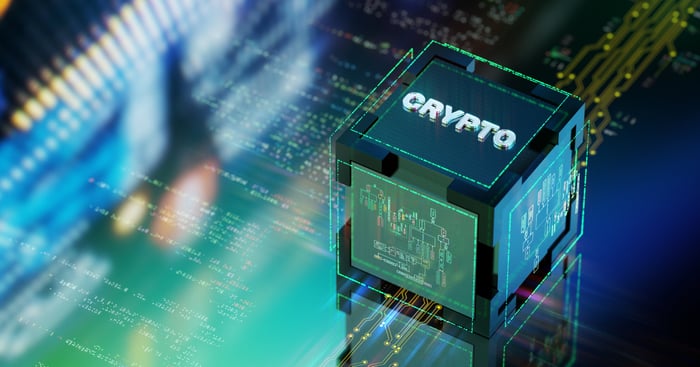Solana (SOL 2.87%) and Binance Coin (BNB 2.59%) are both volatile cryptocurrencies, but they generated big gains for their patient investors. Over the past five years, Solana's price has surged more than 8,600% as BNB's price soared over 3,600%. During that same period, Bitcoin's (BTC 1.37%) price only rose by about 860%. Let's see why these two smaller tokens outperformed the world's top cryptocurrency -- and which one is a better buy right now.
The differences between Solana and BNB
Unlike Bitcoin, which is still mined using the energy-intensive proof-of-work (PoW) mechanism, Solana and BNB were built on more energy-efficient proof-of-stake (PoS) blockchains. PoS tokens can't be mined, but they can be staked (locked up) for interest-like rewards. PoS blockchains also support smart contracts, which are used to develop decentralized apps (dApps), non-fungible tokens (NFTs), and other tokenized assets. That's why PoS tokens are often valued by the size of their developer ecosystems, while PoW tokens are generally valued by their scarcity and mining difficulty.

Image source: Getty Images.
Solana and BNB both upgraded their own PoS blockchains to differentiate themselves from Ethereum (ETH 2.81%), the world's largest PoS blockchain. To achieve higher speeds, Solana integrates its own proof-of-history (PoH) validation mechanism, which timestamps transactions before they're validated, into its PoS blockchain. BNB's Smart Chain (BSC) integrates its own proof-of-authority (PoA) mechanism, which centralizes transactions under trusted validators, to improve speed, security, and energy efficiency. However, Solana is much faster than BSC and is generally considered the world's fastest PoS blockchain.
BSC stands out because it's the native token of Binance, one of the world's largest cryptocurrency exchanges, and it's used to power its transactions and smart contracts. BSC's gas fees notably decline as its network activity increases, but Solana's fees increase as its network activity rises.
Solana's strengths and weaknesses
Solana excels in raw speed, and it expanded its ecosystem with its digital payments platform Solana Pay, support for stablecoins, and even its own Android smartphone. Several crypto firms have also submitted their applications for Solana exchange-traded funds (ETFs) to the Securities and Exchange Commission (SEC), and those approvals could draw in more retail and institutional investors. Its high staking yield of about 8% could also attract more yield-seeking investors as interest rates decline.
Yet Solana has still struggled with congestion and security issues in the past. It also isn't natively cross-compatible with other major developer-oriented blockchains like Ethereum, and its core developer languages (Rust and C) have a steeper learning curve than Ethereum's Solidity. Moreover, its Layer 1 (L1) blockchain faces intense competition from various Layer 2 (L2) solutions that can boost the speeds of slower PoS blockchains like Ethereum.
BNB's strengths and weaknesses
BNB isn't as fast as Solana, but it's widely accepted for staking, liquidity pools, decentralized finance (DeFi) projects, and NFT purchases across Binance's ecosystem. It's natively compatible with Ethereum's blockchain (since it was originally an ERC-20 token on Ethereum before transitioning to its own BSC blockchain), so its developers use Solidity to create the apps and crypto assets. VanEck also submitted its application for the first spot price BNB ETF earlier this year.
Unlike Solana, which has 547 million tokens in circulation and no maximum limit, BNB plans to reduce its supply from 139 million tokens to 100 million tokens by burning them (removing them from circulation). Hong Kong-based Nano Labs even recently announced its plans to acquire about 5% to 10% of BNB's circulating supply for $1 billion, and that support could drive other companies to expand their own BNB treasuries.
However, the imprisonment of Binance's co-founder and former CEO Changpeng Zhao for money laundering last year likely weighed down BNB's price. Zhao was released from prison after serving a four-month sentence last September, and expectations for a full pardon from the Trump Administration have been driving BNB's price to fresh highs.
The better buy: BNB
Solana and BNB might continue to attract more speculative investors than Bitcoin. But if I had to choose one over the other, I'd pick BNB because it's backed by a bigger ecosystem of investors and developers than Solana, it hasn't suffered as many outages, and it's shrewdly reducing its circulating supply.





